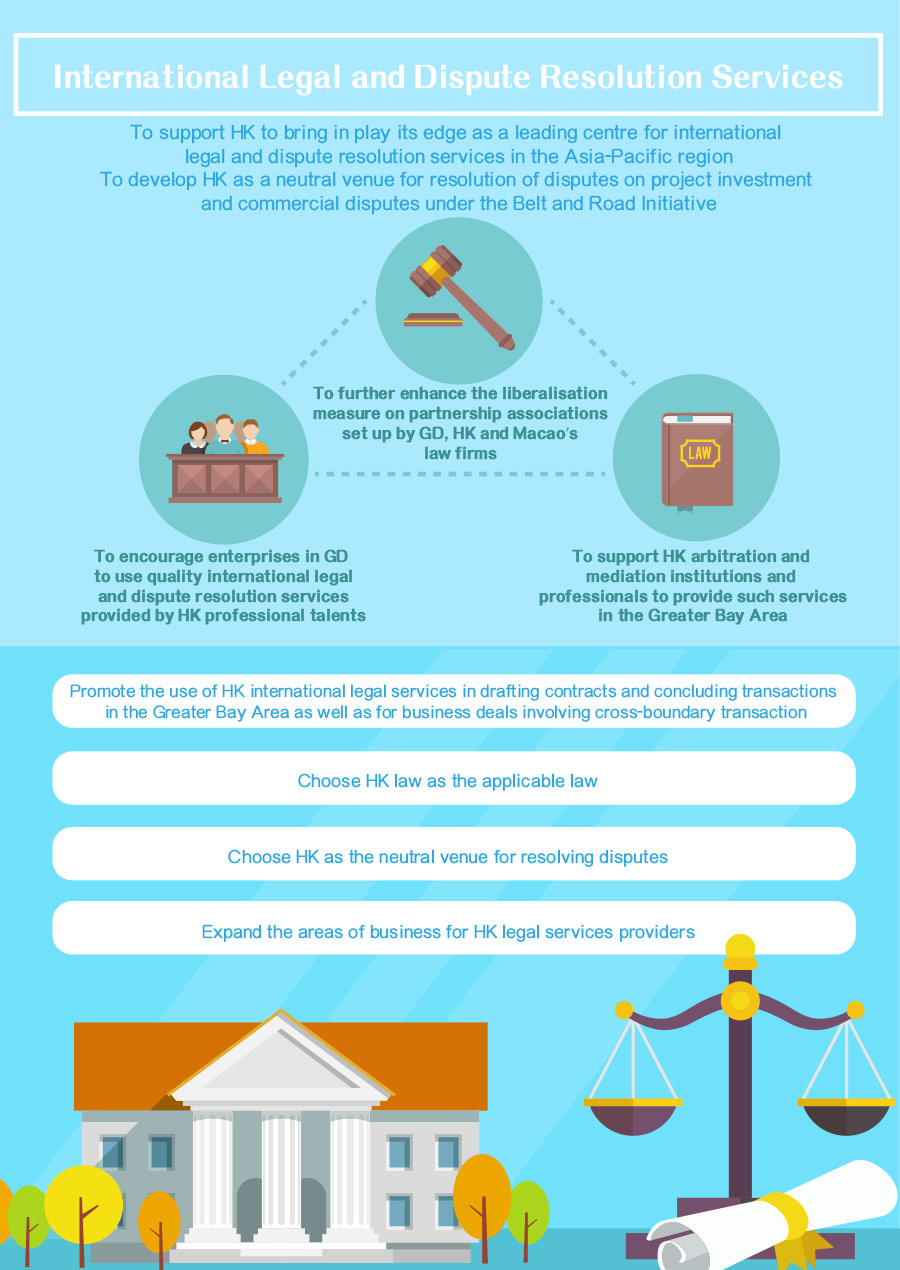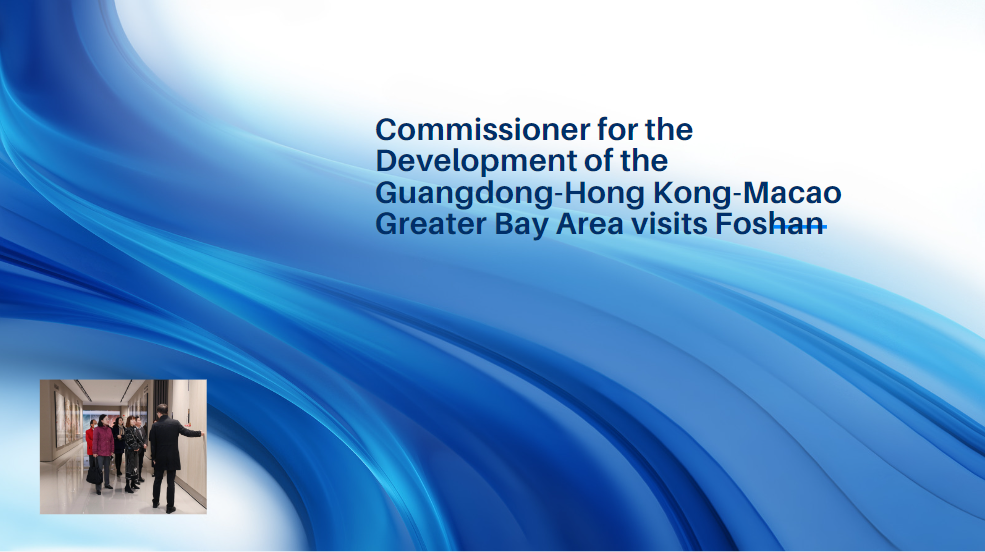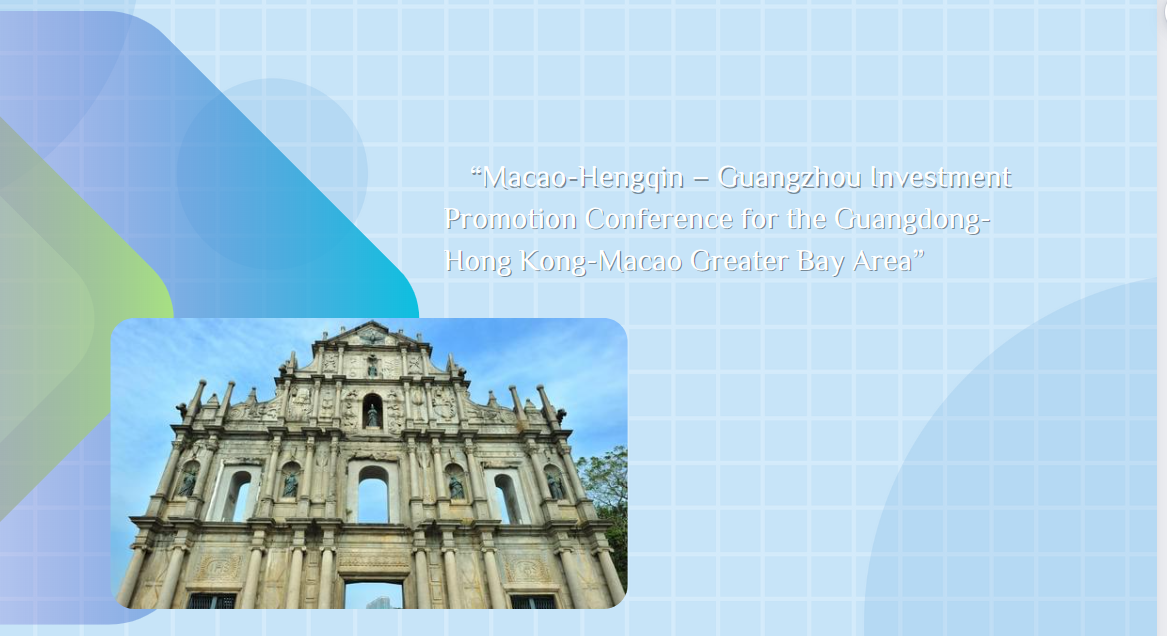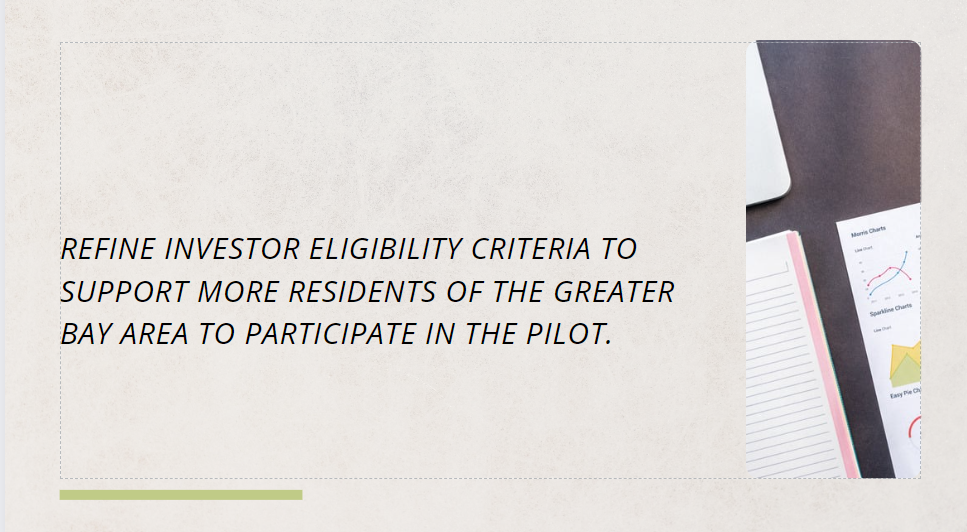Guangdong-Hong Kong-Macao Greater Bay Area: International legal and Dispute resolution services
Development Focus
- To establish Hong Kong as a leading centre for international legal and dispute resolution services in the Asia-Pacific region. To support Hong Kong in becoming a service centre for deal making and resolving investment and commercial disputes relating to Belt and Road projects.
- To strengthen judicial and legal exchanges and cooperation amongst Guangdong, Hong Kong and Macao, promote the development of diverse dispute resolution mechanism based on joint planning, joint contribution and shared benefits, provide quality, effective and convenient judicial and legal services and protection for the development of the Greater Bay Area. To refine the mechanism for international commercial dispute resolution, develop an international arbitration centre, support exchanges and cooperation amongst arbitration and mediation organisations in Guangdong, Hong Kong and Macao, and provide arbitration and mediation services to support economic and trade activities in Guangdong, Hong Kong and Macao.
- To take forward the implementation of special liberalisation measures under CEPA for Hong Kong's international legal and dispute resolution services. To leverage the advantages of Hong Kong in international legal and dispute resolution services, extend and optimise international service networks, and offer consultancy and information support to enterprises.
- To expedite the development of the legal services industry, encourage and support legal services organisations in providing services for the Belt and Road Initiative and for Mainland enterprises going global, expand pilot areas for Guangdong, Hong Kong and Macao law firms to operate in the form of partnership associations. To study matters relating to the qualification and scope of practice of legal practitioners from Hong Kong and Macao in the nine Pearl River Delta municipalities, set up diversified dispute resolution mechanism, and collaborate with Hong Kong to develop an international legal services centre and an international commercial dispute resolution centre.
- Innovation and technology is one of the focuses of the Greater Bay Area. Under this premise, resolving intellectual property right dispute through non-litigation dispute resolution (including arbitration, mediation and consultation, etc.) is promoted, fully leveraging the advantages of Hong Kong in intellectual property protection and related professional services.

Hong Kong has a well-established legal system firmly based on the rule of law. Under the principle of "one country, two systems", Hong Kong’s legal system is based on the common law as supplemented by statue law. Over the years, the Department of Justice (DoJ) has been making every effort to enhance Hong Kong’s status as a leading centre for international legal and dispute resolution services in the Asia Pacific region.
- The DoJ actively cooperates with different international organisations, including the United Nations Commission on International Trade Law and the Hague Conference on Private International Law, in organising different activities to promote Hong Kong as a centre for international legal and dispute resolution services in the Asia Pacific region.
- Hong Kong will continue to make good use of the dual advantages brought by "one country" and "two systems" to establish a professional legal services platform for "deal-making and dispute resolution". The DoJ provides training on international law, judicial skills and dispute resolution for judges, legal practitioners and government officials in Asia and other places.
- It also actively supports and encourages the private sector to establish an online dispute resolution platform known as eBRAM (electronic Business Related Arbitration and Mediation). The platform provides an efficient, cost-effective, and safe platform for resolution of disputes, including commercial and investment disputes under the Belt and Road Initiative and cross-border disputes. The DoJ also supports the development of a smart contract platform on eBRAM, which will provide an interface for cross border deal making between enterprises.
- The New York Convention applies to Hong Kong, and Hong Kong arbitral awards are enforceable in over 150 Contracting States.
- The Panel and the List of Arbitrators maintained by the Hong Kong International Arbitration Centre include different types of arbitrators. These experienced arbitrators come from various countries or regions, and are professionally trained and specialised in different jurisdictions and practice areas. They can provide high-quality international legal and dispute resolution services.
- The International Chamber of Commerce International Court of Arbitration, the China International Economic and Trade Arbitration Commission and the China Maritime Arbitration Commission have set up offices or arbitration centres in Hong Kong. The China Council for the Promotion of International Trade, in collaboration with the Hong Kong Meditation Centre, has set up the Mainland – Hong Kong Joint Mediation Center, providing a platform for resolving cross-border commercial disputes for Hong Kong and the Mainland.
- In 2017, the Legislative Council passed two legislative amendment bills relating to arbitration and mediation, thereby encouraging parties to use arbitration and mediation to resolve disputes efficiently and effectively.
- An Investment Agreement was signed in June 2017 between the Hong Kong Special Administrative Region Government and the Ministry of Commerce under the Mainland and Hong Kong Closer Economic Partnership Arrangement (CEPA) framework. It provides a "Mediation Mechanism for Investment Disputes" which encourages Mainland investors to use Hong Kong mediation services to resolve cross-boundary investment disputes relating to the Investment Agreement. Hong Kong investors may also appoint designated Mainland mediation institutions and mediators to assist in resolving similar disputes. The mechanism promotes the broader use of mediation in cross-boundary dispute resolution. The mutually agreed lists of mediation institutions and mediators of both sides were announced in December 2018. A set of mediation rules for adoption by designated mediation institutions and mediators of the respective sides were also announced and put in place in December 2018.
- With the CEPA Mediation Mechanism in place, the DoJ will work towards becoming a training centre for investment law and investment mediation, with a view to building up a team of investment mediators in Asia. In October 2018, DoJ co-organised with the International Centre for Settlement of Investment Disputes and Asian Academy of International Law the first Investment Law and Investor-State Mediator Training course in Asia. Participants included government officials from the Mainland, ASEAN countries, the Middle East, Africa, South America and Hong Kong, as well as local and overseas legal and mediation practitioners.
⬇More info available at the official website:






















































First, please LoginComment After ~